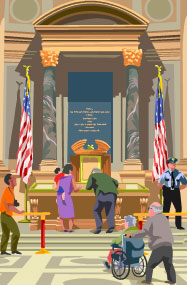

Despite the ability of Congress to "stretch" its powers, there are two major sources of limitations on the powers of Congress: Article I, Section 9, of the Constitution and individual rights.
Right after Article I, Section 8, grants Congress power, Section 9 limits it. Among the prohibitions in this section are granting titles of nobility, taxing goods, traveling between states, passing bills of attainder, and making ex post facto laws. A bill of attainder is legislation that declares people criminals without giving them a trial. An ex post facto law is a law that is enforced retroactively, meaning that you can be guilty of an action that you committed before the law made it illegal.
The guarantee of individual rights found in the Bill of Rights and other constitutional amendments is the major limitation on the power of government. The first amendment begins, "Congress shall make the law." In 1787, people insisted that the Framers add the Bill of Rights to make sure that Congress did not abuse its power.
The Bill of Rights protects most of the rights you are familiar with, such as freedom of speech or the right to a fair trial. Five of the other amendments address an individual's right to vote.
In this activity, you will further explore how government is limited. You will confront possible laws. You need to decide if the laws are clearly part of the enumerated powers of Congress, are part of the implied powers, or are prohibited. To classify them, click on the green light if the law is enumerated, yellow light if it's implied, and red light if it's prohibited.
To help you with this activity, click here for a summary sheet of some major powers of Congress.